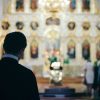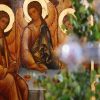“The kingdom of heaven is like a merchant in search of fine pearls, who, on finding one pearl of great value, went and sold all that he had and bought it.” Mat. 13:45-46.
A story tells of a noble family which received a great gift, a pearl of priceless value. Such was its beauty and power that the family stored it in a lovely jewel box. Later generations valued not only the pearl but also the jewel box. For safekeeping, both the pearl and the jewel box were placed in a larger jewel box crafted with exquisite care. As generations passed larger jewel boxes were built, artfully adorned with intricate carvings, mystical symbols and colorful paintings. The family, now grown very large, was proud of its noble heritage. Outsiders too came and admired the antiquity and beauty of the treasure. Then one day someone asked: “What’s in the jewel box?” Many hesitated to give a clear answer. Few seemed to know for sure.
Today we celebrate the Sunday of Orthodoxy, a historic event in the life of the Orthodox Church marking the restoration of icons as an expression of our faith (843 AD). The first Sunday of Orthodoxy was held in 878 in Constantinople and it has been commemorated ever since for over a thousand years. We call this celebration “the triumph of Orthodoxy” highlighted by the importance of icons in Orthodox worship.
What is the meaning of icons? The icons of Christ, the Virgin Mary and the saints remind us how real our salvation is. Christ, the eternal Word of God, took on flesh and blood, walked on this planet, suffered and died, and rose from the dead for our salvation. The saints were real people too, like us, with families, friends, jobs, responsibilities, weaknesses, failings. But through unfailing faith and the grace of God they won a victory over sin and evil, a triumph of faith, and they serve as shining examples for us. Icons also remind us of the spiritual world, the world of saints and angels, the realm of God’s kingdom, which is our own destination. Icons are “windows to heaven” and “theology in pictures” which help lift up our hearts and minds in prayer and worship. We do not worship icons or any created being. We honor and praise the saints as Christ-like examples. We worship only God and God alone, whom we know from the Scriptures and the teaching of the Church as Father, Son and Holy Spirit.
The triumph of Orthodoxy is the story of the Bible, the story of Jesus, the story of the Church, a story of sacrifice and faith. It is a story of grace and life overcoming the powers of sin and death. It is the triumph of God working in and through people, both the righteous and the sinners, a divine struggle in the plains and hilltops of history, for the sake of love, truth, justice and salvation. In the words of today’s Epistle reading: “Through faith the saints conquered kingdoms, enforced justice, received promises, stopped the mouths of lions . . . they suffered mocking and scourging, chains and imprisonment, they were stoned, killed, afflicted—of whom the world was not worthy.” It is the story of Almighty God, patiently and lovingly, trying to set the world straight, to draw all humanity into the sphere of His kingdom, through grace and righteousness.
Today we rejoice in the treasures of the Orthodox Church. We delight in the veneration of icons which connect us to the communion of saints and angels. We proclaim the truth and glory of Orthodoxy in the form of a great confession of faith, often abbreviated for reasons of time. We triumphantly declare: “This is the faith of the Apostles! This is the faith of the Fathers! This is the Faith of the Orthodox! This is the faith that upholds the universe!”
What is the essence of our faith, the center of our joy, the priceless pearl of Orthodoxy, found at the very heart of the Orthodox Church and all its rich heritage of sacraments, teachings and pious traditions? We can answer with the joyous words of the first apostles from today’s Gospel reading (John 1:43-51). The Apostle Philip shouted to the others: “We have found Him of whom Moses and also the Prophets wrote!” And Nathaniel cried out to Christ: “Teacher, You are the Son of God! You are the King of Israel!” Commenting on this passage, St. John Chrysostom wrote: “See how Nathaniel’s soul is filled with joy? See how he embraces Christ with words of faith? See how he leaps and dances with delight? So should we all also rejoice, who have been made worthy to know the Son of God.”
The Sunday of Orthodoxy invites us to do just that: to embrace Christ with all our hearts, to delight in Him with true joy, to glorify Him as our Lord and Savior, to see that He Himself is the good news of salvation, the beauty and truth, the grace and glory, shining in all the treasures of our Orthodox Faith. He and He alone is the priceless pearl of Orthodoxy. Let us be clear: Christ is Orthodoxy and Orthodoxy is Christ. Without Christ, that is, without His living presence among us, Orthodoxy is but a beautiful antique piece fit for a museum. But with Christ, with His empowering presence and love in our hearts and lives, Orthodoxy is a burning bush of grace and glory, a living and vibrant witness to God, a bright beacon illuminating the path to a lost but ever seeking world.
What would you reply if a visitor to our Church asked you: “What’s in the jewel box?” Would you respond promptly and with conviction? Or would you hesitate and stumble for an answer? Would you say, “Christ our Lord is the priceless pearl, the Leader of our Church, the One who said, ‘I am the light of the world’ (John 8:12) and ‘Love one another as I have loved you’ (John 13:34). What more could you say about the importance of Christ for Orthodoxy? What if you were asked, “What does Christ mean to you? What difference does Christ make in your own life?” What would you say to a potential inquirer and convert to Orthodoxy?
The early Christians were eager to share their faith and joy in Christ. St. John the Beloved Disciple testifies: “We have beheld His glory, glory as of the only Son of the Father” (John 1;12). And again: “That which we have seen with our eyes, and touched with our hands . . . we proclaim to you, so that you may have communion with us. And our communion is with the Father and with His Son, Jesus Christ” (1 John 1:1:1-4). The Apostle Paul writes: “For me to live is Christ” (Phil. 1:21). And again: “It is Christ who lives in me; and the life I now live in the flesh I live by faith in the Son of God, who loved me and gave Himself for me” (Gal. 2:20).
Most of us possess neither the spiritual perfection nor the fervent love of Christ as did the Apostles, the earliest Christians and the saints of the Church. But we can sincerely strive to grow in our own faith and love for Christ according to our circumstances and opportunities given to us by God. The first great truth to embrace and hold to is that Christ reveals to us the life of God, the fullness of the presence of God, the very character of God as light, life, love, grace and glory. The close we come to the mystery of Christ, the closer we come to the mystery of the living God. In the words of St. John the Beloved Disciple, “In Christ was [the divine] life, and the life was the light of humanity. The light shines in the darkness, and the darkness has not overcome it” (John 1:4-5).
The second great truth is the humility and sacrifice of Christ, His self-offering on the Cross for our forgiveness and salvation. Christ is “the Lamb of God who takes away the sin of the world” (John 1:29). We know that at the Last Supper on the night before His death, Christ signified the meaning of His death by solemn words and actions over the bread and the wine. He broke the bread and said: “Take eat; this is my Body.” Then He took the cup and said: “Drink of it, all of you; for this is my Blood of the new covenant, poured out for many for the forgiveness of sins” (Mat. 26:26-28). In Christ the Lord, who is the crucified and risen Savior, we have our ultimate foundation of salvation, the overcoming of the powers of darkness, the hope of the world.
The third great truth is that Christ is the Giver of the Holy Spirit. The Holy Spirit is a distinct person of divinity by Whom all of God’s gifts and blessings are energized in the Church and our personal lives. Jesus said: “I came to cast fire on the earth” (Luke 12:49)! He was speaking of the fire of the Holy Spirit that the Apostles were to receive on the day of Pentecost. Christ had promised to the disciples: “I will send to you from the Father, even the Spirit of truth, who proceeds from the Father, [and] He will bear witness to Me” (John 15:26). On the day of Pentecost the risen Christ became a fire starter and His Church a community ablaze with the grace of the Holy Spirit with the mission to spread the gospel to the four corners of the earth.
Orthodoxy is a spiritual movement and not just a beautiful institution defined my beautiful forms and countless regulations. We are a community alive with the presence and power of Christ. We are the community of the Holy Spirit. We are the keepers and spreaders of holy fire. Our prayer and our hope in all our efforts and aims are through Christ, the pearl of Orthodoxy. To Him we cry out with the words of today’s main hymn: “You have filled all things with joy, O Savior, You who has come to save the world.” Amen.
THE CONFESSION OF THE ORTHODOX FAITH:
As the Prophets beheld, as the Apostles taught, as the Church received, as the teachers decreed, as Christians in all times and places affirmed, as grace was given, as truth was revealed, as wisdom was disclosed, and as Christ confirmed:
Thus we confess, declare and proclaim Christ our true God and honor His saints in words, writings, thoughts, sacrifices, sanctuaries and holy icons.
We worship and reverence Christ as God and Lord. We honor and venerate the saints as His true servants.
This is the faith of the Apostles! This is the faith of the Fathers! This is the faith of the Orthodox! This is the faith that upholds the world!
Further, we praise and salute the blessed memory of the heralds and defenders of the Orthodox Faith, pious kings, holy patriarchs, hierarchs, teachers, martyrs, confessors, and all Orthodox faithful. May their memory be eternal!
We pray that, guided and strengthened by their struggles and victories, which were unto death, we ourselves may prove imitators of their godly life, and may be found worthy of the mercy and grace of the great and first High Priest, Christ our true God, through the intercessions of the glorious Theotokos, the holy angels, and all the saints. Amen!
















